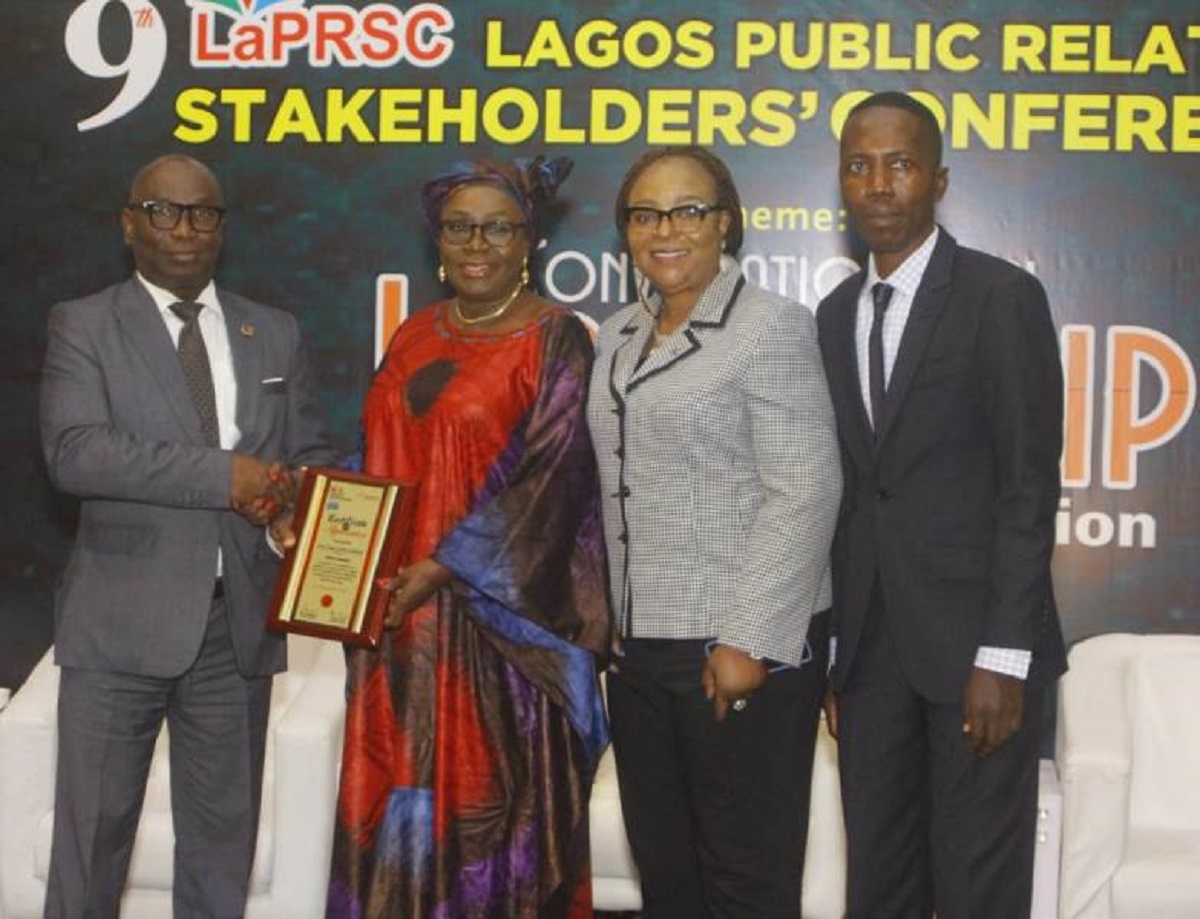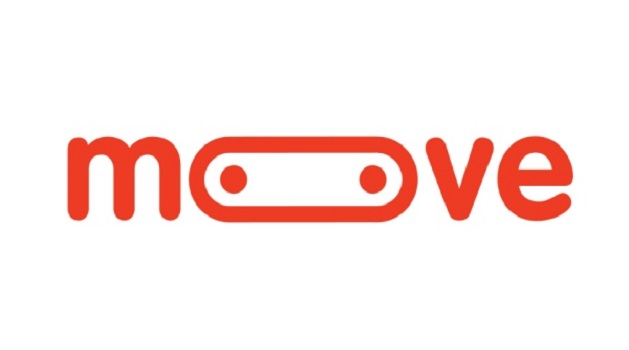General News
LaPRSC: Danbatta Highlights Why Nigerians Must Explore Opportunities in the Digital Economy to Eradicate Poverty

Professor Umar Garba Danbatta, Executive Vice Chairman/ CEO, Nigerian Communications Commission, on Thursday addressed the 9th Lagos Public Relations Stakeholders’ Conference on Leadership and Poverty Eradication.

L-R: Mr Sina Thorpe, Council Member, NIPR; Mrs Nnena Ukoha, Head, Corporate Communications, NCC: Mrs Comfort Obot Nwankwo, Chairman, NIPR Lagos and Conference Convener, Mr Olabamiji Adeleye, Lead Consultant, Addefort Limited at the 9th Lagos PR Stakeholders’ Conference on Leadership and Poverty Eradication on Thursday August 18, 2022.
The EVC, represented by Mrs Nnena Ukoha, Head, Corporate Communications, called on Nigerians to explore opportunities in the Digital Economy to eradicate poverty in the country.
Speaking on the topic, Poverty Eradication in Nigeria: Leveraging Opportunities in a Digital Economy, he noted that ”For most developing countries, particularly those with large populations, inadequate infrastructure has made it difficult to participate as equal partners in the worldwide enterprise of knowledge production and dissemination.
“This portends an unequal distribution of access, resources and opportunities in this new economy, the Digital Economy.
“To avert the birth of a new type of poverty (Information Poverty), the ICT gap (digital divide) between the developed and developing nations must be bridged.”
That Nigeria like most developing nations is not enjoying the full benefits of the ICT revolution due to inadequate telecommunication infrastructure, capacity to maintain existing infrastructure, and policies for equitable public participation as producers and consumers of information and knowledge.
“A nation’s development is measured in economic terms such as per capita income, Gross Domestic Product (GDP), and Gross National Product (GNP), among other indices. Indices such as level of literacy, social development, human capital development, cultural innovation and technological preparedness are not regarded as a measure of development. If we must tap into the ICT revolution, then it is time for a paradigm shift! The traditional economic terms are not a reflection of the new age of the Digital Economy “he said.
On efforts made by the Nigerian government, “There are several past and ongoing efforts by the Nigerian Government to alleviate poverty through ICT using organizations and programmes like the National Information Technology Agency (NITDA), using the offices of the Nigerian Postal Service (NIPOST) across the country as ICT hubs, the Universal Service Provision Fund (USPF) to ensure that telecommunications services are accessible to the widest number of people (and communities) at affordable prices.
USPF has poverty-reducing activities like the Community Resource Centers, USPF Hackathon, RUBI – Rural Broadband Initiative, UnICC – University InterCampus Connectivity, BTS – Base Transceiver Stations, IRC – Information Resource Centres, SKC – School Knowledge Centres, and the E-Health Project. “
The EVC said that “NCC will continue to support the vision of the present government to put Nigeria amongst the top twenty in the comity of Nations and to align our developmental goals in keeping with the seventeen United Nations Sustainable Development Goals (SDGs) but particularly the goal to eradicate extreme poverty for all people everywhere which is currently measured as people living on less than $1.25 a day, by year 2030.
He listed initiatives at the NCC directly or indirectly target poverty eradication to include;
“Advanced Digital Appreciation Programme: Transforming the Academics: Advanced Digital Appreciation Programme for Tertiary Institutions, ADAPTI is aimed at bridging the digital divide existing in academia with the provision of computers and other ICT facilities to equip the lecturers and other experts in order to improve ICT skills and also to enrich the students.
“The overriding objective of this intervention has been to elicit the pervasive application of ICT skills in academia for enhanced staff output, institutional efficiency, and student enculturation to e-based learning for sustainable national growth.”
“Digital Awareness Programme (DAP): this is a special intervention programme to address the digital information knowledge gap in the country, especially among the teeming youthful population. On the last count, the DAP Project supports 229 Secondary Schools across the Six (6) Geopolitical Zones of Nigeria, including the Federal Capital Territory.
“The strategy in this programme is to expose schools and colleges to Information and Communications Technology (ICT) awareness, usage and application by facilitating access to ICT tools by the provision of twenty one (21) Desktop Computers, Local Area Network, Printers, Scanners, VSAT Dish and deployment of one Year Bandwidth Subscription for Internet Access.”
“NCC- Digital Bridge Institute (DBI) Projects: Nigeria’s ICT flagship institution, the Digital Bridge, DBI, came into existence in 2004 to impact on the national ICT human capital building efforts by bridging the ICT knowledge gap.”
“Frequency Auction: Contributing to National Purse: The Nigerian telecom regulator has contributed to the Federation Account from proceeds of frequency auctions and licensing.
“The frequencies auctioned, are in turn used for the deployment of services for poverty reduction and the benefit of the citizenry. The Commission has a clear understanding of this value chain and is determined to uphold it. “
“Value Added Services (VAS): Telecommunication has given birth to several value-added services that open up benefits to all cadre of people irrespective of location and level of education.
“These VAS are great channels for revenue generation. Some VAT are content development, Phone repair network, IT device accessories sales market (phone pouches, screen covers etc), Ringback tones, and even government agencies providing service on telecom platform e.g NAFDAC – drug authentication code. “
On broadband and poverty , “The Nigerian National Broadband Plan 2020–2025 (the “Broadband Plan”) devotes an entire section to targets, strategies and roadmaps to promote pervasive broadband deployment, increased broadband adoption, usage and availability to all at affordable prices.
“These all point to government’s commitment to harmonizing and utilizing the benefits derivable from ICT for the good of all. “
“In 2020, the latest National Broadband Plan was approved to foster fuller economic exploitation of ICTs. This means that there will be more pervasive deployment and usage of ICT to push the development and economic attractiveness of the nation.”
He assured that The Federal Government of Nigeria is committed to sustainable development of the ICT subsector for the growth of the economy and the eradication of poverty.
“This was made evident during the just concluded Communications sector retreat where the Ministry of Communications and the agencies under it converged to chart a five-year plan that would make communications services, affordable, accessible, and available to all persons in Nigeria.”
He concluded that “The credit for Nigeria’s ambitious broadband pursuit is traced to the potentials and prospects of broadband technology, the ease of deployment and the vast opportunities available through it.
“The Commission will continue to put strategies in place to pursue last mile deployment of broadband. This would ensure small businesses are positioned to compete globally and communities and individuals are able to create wealth through access to ICT.”
“By providing access to information, making markets more efficient, fostering social inclusion, and equalizing opportunities in rural areas, ICT offers an innovative and unprecedented tool to directly reduce poverty.”
Other speakers at the event include; Founder and Chairman, Heirs Holdings, Mr Tony Elumelu; Mr Segun Ajayi-Kadir, Director General, Manufacturers Association of Nigeria (MAN); Sheila Ojei, Director Strategy, Funding and Stakeholders Management, LSETF; The Commissioner for Women Affairs and Poverty Alleviation, Lagos State, Mrs Cecilia Bolaji Dada and Dr Oluseye Ajuwon, Economist and Consultant, University of Lagos.
General News
Cybervergent Selected as World Economic Forum’s 2025 Technology Pioneer Company

In affirmation of its global standing, Cybervergent, a Pan-African technology company that leverages artificial intelligence to transform how organisations manage risk, governance, privacy, and cybersecurity, has been selected as one of the World Economic Forum’s (WEF) Technology Pioneers for 2025—a global cohort spotlighting companies transforming industries through breakthrough technologies and responsible innovation.

The WEF, an international organisation committed to improving the state of the world through public-private collaboration, brings together global leaders to shape economic, technological, and societal agendas. Cybervergent now joins this global community.
The company is recognized for its innovative approach to building digital trust, reimagining how organisations manage cybersecurity, risk, privacy and governance.
Commenting on the company’s milestone, Adetokunbo Omotosho, CEO of Cybervergent, said, “I am honoured that Cybervergent has been named a Technology Pioneer by the World Economic Forum. This is more than an accolade — it’s a validation of our commitment to redefining cybersecurity, privacy, and risk management to build true digital trust.
“What makes this recognition even more meaningful is the fact that Cybervergent demonstrates innovation in AI and infrastructure can emerge from any region, challenging conventional perceptions.”
Some past recipients of the Technology Pioneer recognition, including Google, Spotify, and Airbnb have gone on to fundamentally reshape global industries.
As a member of the 2025 Technology Pioneers community, Cybervergent will be contributing to discussions shaping cybersecurity, AI, and cyber resilience across industries and the global digital economy.
General News
Moove Plans to Raise $1.2Bn Debt Round for US Autonomous Vehicle Expansion

Moove, an African mobility fintech startup, is on a quest to secure a $1.2 billion debt financing round to support the rollout of a fleet of autonomous vehicles.

This is in partnership with Alphabet Inc.’s Waymo in the United States, according to a Bloomberg report citing sources familiar with the matter.
The startup has since attracted backing, including from Uber Technologies Inc., and entered a strategic partnership with Waymo in December 2024 to provide financing for self-driving cars.
Ladi Delano, co-founder of Moove, noted that the company has a solid financial track record.
“Moove has built strong relationships with some of the world’s leading lenders. We have also fully repaid our first-ever debt facilities, which signals our maturity and marks a key milestone that demonstrates the strength of our platform as we enter the next phase of global autonomous-vehicle infrastructure deployment,” he said.
The round is reportedly oversubscribed, with strong participation from private credit firms and banks.
Waymo has also not made any official statement regarding the funding round. While final details are expected to be concluded in the coming weeks, the deal will mark a significant milestone for the firm as it ramps up its global ambitions.
Founded in 2020 by Nigerian entrepreneurs, Ladi Delano and Jide Odunsi, Moove began by providing vehicle financing for ride-hailing drivers in Africa’s largest cities.
General News
Firm Explores the Evolution of AI-powered Ransomware with Password-gated Capabilities

Kaspersky experts have revealed the inner workings of FunkSec — a ransomware group that illustrates the future of mass cybercrime: AI-powered, multifunctional, highly adaptive and operating on volume with ransoms as low as $10,000 to maximise profits.

Kaspersky’s Global Research and Analysis Team (GReAT) constantly monitors the ransomware threat landscape, where attacks continue to rise. According to the company’s latest State of Ransomware report, the share of users affected by ransomware attacks worldwide increased to 0.44% from 2023 to 2024, up by 0.02 percentage points.
While this percentage may appear modest compared to other cyber threats, it reflects the fact that attackers typically prioritise high-value targets rather than mass distribution, making each incident potentially devastating. Within this evolving landscape, FunkSec has emerged as a particularly concerning threat.
Active for less than a year since its emergence in late 2024, FunkSec has quickly surpassed many established actors by targeting government, technology, finance and education sectors. What sets FunkSec apart is its sophisticated technical architecture and AI-assisted development.
The group packages full-scale encryption and aggressive data exfiltration into a single Rust-based executable, capable of disabling over 50 processes on victim machines and equipped with self-cleanup features to evade defenses.
Beyond its core ransomware functionality, FunkSec has expanded its toolkit to include a password generator and a basic DDoS tool — both showing clear signs of code synthesis using large language models (LLMs).
FunkSec’s approach reflects the evolving landscape of mass cybercrime, combining advanced tools and tactics. Kaspersky’s GReAT experts highlight the key features that define their operations:
Password-Controlled functionality
GReAT experts discovered that FunkSec ransomware features a unique password-based mechanism that controls its operation modes. Without a password, the malware performs basic file encryption, while providing a password activates a more aggressive data exfiltration process in addition to encryption to steal sensitive data.
FunkSec packs full-scale encryption, local exfiltration and self-cleanup into a single Rust binary—without a side-loader or a companion script. That level of consolidation is uncommon and gives affiliates a plug-and-play tool they can deploy almost anywhere.
Use of AI in development
Code analysis shows that FunkSec is actively using generative artificial intelligence to create its tools. Many parts of the code seem to be automatically generated rather than manually written. Signs of this generic placeholder comments (such as “placeholder for actual check”) and technical inconsistencies, like commands for different operating systems that don’t align properly. Additionally, the presence of declared but unused functions—such as modules included upfront but never utilised — reflects how large language models combine multiple code snippets without pruning redundant elements.
“More and more, we see cybercriminals leveraging AI to develop malicious tools. Generative AI lowers barriers and accelerates malware creation, enabling cybercriminals to adapt their tactics faster.
By reducing the entry threshold, AI allows even less experienced attackers to quickly develop sophisticated malware at scale,” comments Marc Rivero, Lead Security Researcher at Kaspersky’s GReAT.
High-volume, low-ransom strategy
FunkSec demands unusually low ransom payments, sometimes as little as $10,000, and pairs this with the sale of stolen data at discounted prices to third parties. This strategy appears designed to enable a high volume of attacks, helping the group quickly establish its reputation within the cybercriminal underground. Unlike traditional ransomware groups that seek million-dollar ransoms, FunkSec employs a high-frequency, low-cost model — further underscoring its use of AI to streamline and scale operations.
Expands beyond ransomware
FunkSec has expanded its capabilities beyond the ransomware binary. Its dark leak site (DLS) hosts additional tools, including a Python-based password generator designed to support brute-force and password-spraying attacks, as well as a basic DDoS tool.
Advanced evasion
FunkSec employs advanced evasion techniques to avoid detection and complicate forensic analysis. The ransomware is capable of stopping over 50 processes and services to ensure thorough encryption of targeted files. Additionally, it includes a fallback mechanism to execute certain commands even if the user launching FunkSec lacks sufficient privileges.

 Telecom2 days ago
Telecom2 days agoMTN Nigeria Debuts Game-Changing CPaaS Platform at NextNow Forum

 News2 days ago
News2 days agoAMCON Confirms ₦100Bn Sale of Ibadan DisCo Amid Legal Disputes

 E-Financial1 day ago
E-Financial1 day agoCourt Affirms NIBSS Authority to Manage BVN

 E-Financial2 days ago
E-Financial2 days agoNAICOM Issues New Licenses to SanlamAllianz Life, General Insurance

 E-Business2 days ago
E-Business2 days agoDomain of Deception as Attackers Deploy Spyware Under Guise of Legal Threats

 E-Financial2 days ago
E-Financial2 days agoGTCO to Become First Nigerian Bank to List on London Stock Exchange

 Telecom1 day ago
Telecom1 day agoMTN, 9mobile Commence Ground-breaking National Infrastructure Partnership

 Broadcasting2 days ago
Broadcasting2 days agoIFC, AfDB Collaborate with EbonyLife Media to Explore Supporting the African Film Industry to Drive Job Creation


























